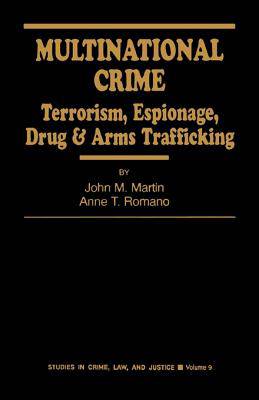
- Retrait gratuit dans votre magasin Club
- 7.000.000 titres dans notre catalogue
- Payer en toute sécurité
- Toujours un magasin près de chez vous
- Retrait gratuit dans votre magasin Club
- 7.000.0000 titres dans notre catalogue
- Payer en toute sécurité
- Toujours un magasin près de chez vous
160,45 €
+ 320 points
Description
When is a crime not a crime? Is espionage "spying" when national security is at stake? Do governments participate in arms trafficking when supplying revolutionaries the means to overthrow a despot? In a departure from past research, Martin and Romano explore multinational crime from a criminological perspective. Proceeding from an interactionist as well as a socio-cultural conflict theory, the authors argue that multinational crime is not random violence. Instead, they contend that these offenses are organized and systematic, cutting across national boundaries by involving a minimum of two countries. The starting block for more rigorous study of multinational systemic crime, this unusual volume emphasizes the value of studying organizations involved in these crimes, as well as the regional and global settings in which they operate. Chapter 1 relates multinational crime to the other major forms of crime studied by criminology and criminal justice. The following two chapters describe four types of multinational crime--drug trafficking, terrorism, espionage, and arms trafficking. Chapter 4 reviews the interrelationship of such crimes to the international scene; the role of values, interests, and power; and the part of "national security" interests in limiting information access. The authors then identify several problems in theory construction and policy development. The last chapter includes a description of three significant global regions: the Golden Triangle of Southeast Asia, the Middle East, and the Andean region of Colombia, Bolivia, and Peru. Multinational Crime responds to a world paralyzed, held hostage by the perpetration of these horrific offenses. Professionals and students in the areas of criminology, political science, sociology, foreign policy, international relations, foreign affairs, and policy studies are sure to find this volume intense and vital reading. "For those interested in a compact, well-written treatise on the subjects of terrorism, espionage, and drugs and arms trafficking and their interrelationships, this book will prove invaluable. . . .Starting from issues related to definitional and perspective problems, the authors set forth a paradigm that challenges many of the accepted approaches to studying multinational criminal activity. . . .Of particular interest is the expanding role played by governments, and the point at which their actions become criminal, as when they compound criminality by overlooking one criminal act in order to stop another crime. . . .This book should draw the attention of both practitioners and scholars, as well as policy-makers, for the authors raise a number of compelling arguments for a new approach to a better understanding of the threat of multinational crime." --Criminal Justice International "I congratulate you both [John M. Martin and Anne T. Romano] on an invaluable contribution to the study of multinational crime, and the conceptual views you express in its pages--which I fully support. These views are having a profound effect on the shaping of our operational policy." --Colonel A. D. Couperin, International Data Evaluation Program
Spécifications
Parties prenantes
- Auteur(s) :
- Editeur:
Contenu
- Nombre de pages :
- 162
- Langue:
- Anglais
- Collection :
- Tome:
- n° 9
Caractéristiques
- EAN:
- 9780803945982
- Date de parution :
- 01-03-92
- Format:
- Livre broché
- Format numérique:
- Trade paperback (VS)
- Dimensions :
- 141 mm x 217 mm
- Poids :
- 254 g

Les avis
Nous publions uniquement les avis qui respectent les conditions requises. Consultez nos conditions pour les avis.






